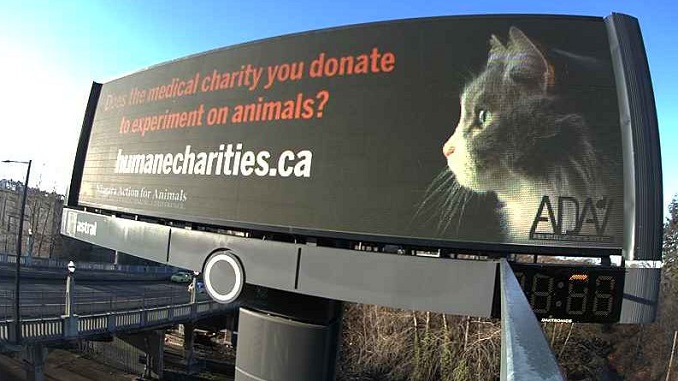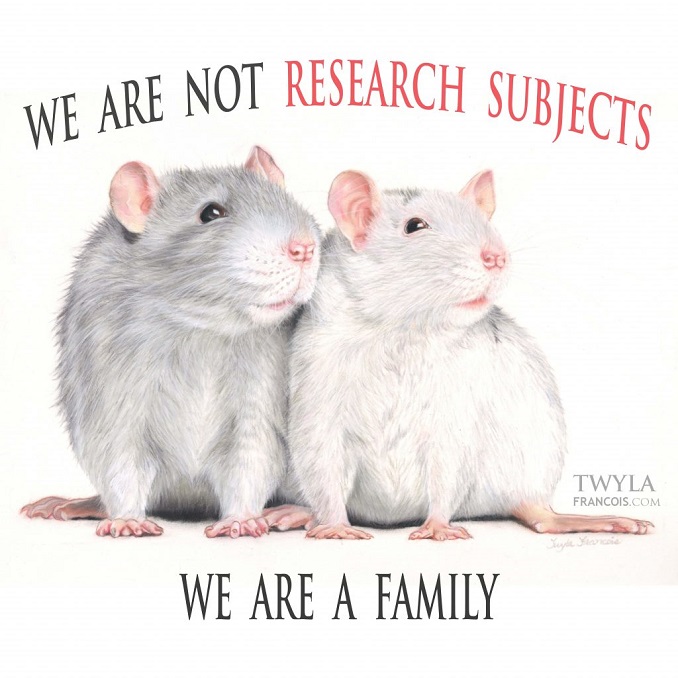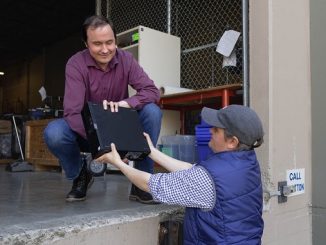The Animal Defence & Anti-Vivisection Society of British Columbia (ADAV) aims to inform the public of the grim realities faced by animals used in experiments, promote the use of superior and more humane non-animal alternatives, and alert the public to the proven invalidity of basing human medicine and toxicology on other species. Recently we spoke with Communications Director Renea Mohammed to learn more about what they do.

Describe your charity/non-profit/volunteer work in a few sentences.
The Animal Defence & Anti-Vivisection Society of British Columbia (ADAV), established by a veterinary surgeon in 1927, is a peaceful, grassroots organization committed to the abolition of vivisection on moral, ethical and scientific grounds.
The ADAV Society strives to inform the public of the grim realities faced by animals used in experiments, promote the use of superior and more humane non-animal alternatives, and alert the public to the proven invalidity of basing human medicine and toxicology on other species.
We conduct outreach events and letter-writing campaigns, sponsor speaker series, and network with other groups nationally and internationally in an effort to change policies on animal experimentation.
The Animal Defence & Anti-Vivisection Society of British Columbia (ADAV) is the parent organization of Humane Charities Canada.
What problem does it aim to solve?
We wish to end animal testing and research in favour of more humane, modern and accurate alternatives.
When did you start/join it?
I joined a few years ago.
What made you want to get involved?
I was motivated to join by the suffering of the often-forgotten animals in labs. I think they are often forgotten because the level of suffering they endure causes people to not want to think about them. There is also a widespread lack of knowledge about more modern
alternatives. For information on alternatives, see our page on alternatives.
What was the situation like when you started?
Laws in both Canada and the U.S. required new drugs to be tested on animals, despite growing recognition that animal models are poor predictors of human outcomes with over 95% of new drugs failing in human clinical trials. Crustaceans were viewed as non-
sentient and even as not feeling pain by many people. Animals were still being used for research by the cosmetics industry. There was widespread lack of awareness about the inadequacies of animal models and the existence of newer approaches based on the biology of humans.
How has it changed since?
Progress has been made at the time of this writing. At the end of last year, the U.S. brought five animal protection measures into law that included the elimination of a federal mandate for animal testing for new drugs and for biosimilars with the FDA Modernization Act 2.0. In the European Union, it is illegal to sell cosmetic products tested on animals. There is also an EU Directive to phase out biomedical experiments on animals. In the U.S., it is against the law to sell cosmetics tested on animals in ten states. In the U.K. crustaceans have been recognized as sentient beings in an amendment to the Animal Welfare (Sentience) bill.
In Canada, we still have a ways to go to catch up, but in the last federal election animal testing by the cosmetic industry became an election issue. The government still needs to make good on its promise to ban cosmetic testing on animals though. We also have the Canadian Center for Alternatives to Animal Methods (CCAAM) and the Canadian Centre for the Validation of Alternative Methods (CaCVAM) located at the University of Windsor. These organizations are doing groundbreaking work here.
What more needs to be done?
Animal models in research need to be abandoned in favour of newer, more human-centric approaches. In Vancouver, the new St. Paul’s Hospital and Health Campus currently being constructed is slated to have two separate research towers, 800,000 square feet, that will include animal labs. Instead of clinging to such historical models an opportunity exists to develop new and truly innovative approaches as University of Windsor is doing. All institutions should be reallocating research and development funds to focus on human-centric non-animal methods and teaching them to researchers.
Our new Ditch Dissection campaign provides links to resources for students wishing to study science using sophisticated and more sustainable alternatives to animal use.
How can our readers help?
Please visit our website to find links to our petitions. This is also a great time to write to the government asking them to make good on their promise to end animal testing in the cosmetics industry and, at the same time, to follow the example of the U.S. and stop requiring drugs to be tested on animals.
You can also visit our Humane Charities website to find a list of charities that do and do not test on animals. When making donations, choose the ones that don’t. If asked to make a donation by an organization that does tests on animals, let them know you are declining because of that testing.

Do you have any events coming up?
Yes, we will be at Planted Expo in May and at Meowfest in August. Look for us also to join in community events wherever we can spread the word of non-animal medical research, testing and humane education.
To find out about our upcoming events, please sign up for email and newsletters through our website.
Where can we follow you?
You can visit our website and our Facebook.
We have left Twitter due to Neuralink’s cruel research on animals that involves implanting chips in their brains in order to force them to play games with their minds. Some of the monkeys involved have torn their own fingers off. Neurolink, like Twitter, is owned by Elon Musk. As an alternative to Twitter, we may be setting up a Mastodon account. Please look for us there.
PAY IT FORWARD: What is an awesome local charity that you love?
In addition to our own work, we encourage donations to the International Aid for Animals Foundation, a charity that works to support organizations and people around the world in improving conditions for animals. You can visit their website.




